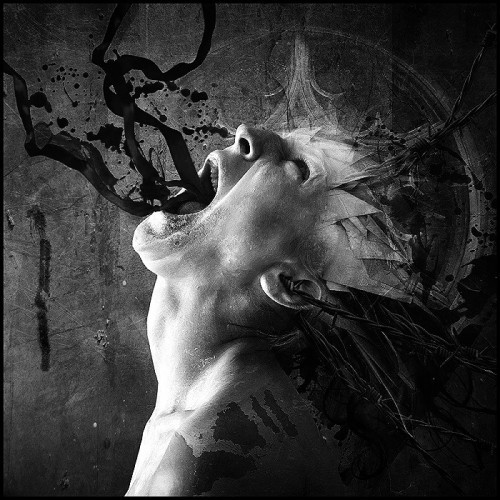
(Our man Andy Synn has been busy recently, but not too busy to help catch us up with a bevy of new (or new-ish) albums from the first quarter of 2021)
We’re now at the end of March and I can officially say that the stream of new releases, re-releases, and surprise releases, has finally gotten the better of me and I have fallen well behind on my “to review” list.
Sacrifices will, inevitably, have to be made, and some things I intended to write about will either have to wait until an opening appears in my schedule somewhere down the line or, in the worst case scenario, have to be content with appearing in one of my year-end round-ups.
But I’m not going to give in to the inevitable without a fight, which is why, in a desperate effort to provide some interesting coverage, commentary, and – in some cases – criticism about a bunch of records (some dating back to January, some only just about to hit the streets) I’ve decided to pen a few thoughts about six different albums – three Death Metal, three Black Metal – which I’ve been meaning to write about for quite some time.
So, without further ado…
AVERSED – IMPERMANENT
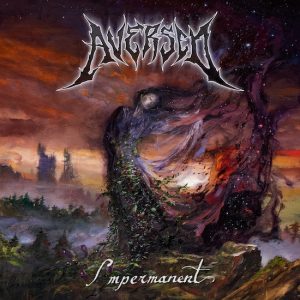 As every (smart) business person knows, it’s better under-promise and over-achieve than vice-versa, but, in the case of Boston-based Melodic Death Metal quintet Aversed, their debut album Impermanent has received so much excess hype and exagerrated praise from certain corners of the Metal-sphere that the band (through absolutely no fault of their own) simply can’t live up to what’s been promised by others on their behalf.
As every (smart) business person knows, it’s better under-promise and over-achieve than vice-versa, but, in the case of Boston-based Melodic Death Metal quintet Aversed, their debut album Impermanent has received so much excess hype and exagerrated praise from certain corners of the Metal-sphere that the band (through absolutely no fault of their own) simply can’t live up to what’s been promised by others on their behalf.
But… that doesn’t mean that you shouldn’t be very excited about what the group has to offer, as this is still a damn good, occasionally even bordering on great, record, which should (with a little luck) introduce the band to a whole new audience.
Despite all the hype, anyone with a clear mind and an honest ear will be able to tell that Aversed’s sound isn’t the most original – there’s clearly a hefty amount of Arch Enemy influence at work (the guitars obviously takes a fair bit of inspiration from the Amott brothers, especially during tracks like “Natsukashi” and “Malaise”), while certain tracks (most notably “Close My Eyes” and “Abandoned”) could easily pass as lesser-known Soilwork songs – but they do it so well, and with such passion and panache that it’s often easy to overlook the obvious similarities (as many people have chosen to).
And while Impermanant isn’t quite as “Progressive” as it’s been made out to be (though both the title track and grandiose finale “Nightshade” demonstrate just what the band are capable of when they really do push the envelope), it’s definitely got proggy ambitions, and Aversed aren’t afraid to explore and experiment with different song-structures as the album progresses (pun intended).
Of course, the real star of the show is Haydee Irizarry, whose humongous singing voice (and biting harsh vocals) is truly something to behold. So much so that, if I were them, I’d very much consider leaning into/on it even more next time around (even if it might lead to more Soilwork comparisons), because there’s absolutely no shame in acknowledging and utilising an ability like this to its full potential… especially since Irizarry’s voice is more than powerful enough that they wouldn’t have to downplay any of the energy/intensity/technicality of their music in the process.
So, yeah, Impermanent might not be the greatest album since [insert album here]. But it’s a hell of a debut, one packed full of promise and potential, from a band with all the tools and talent to go very far indeed.
CREEPING FEAR – HATEGOD TRIUMPH
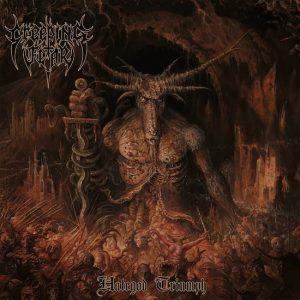 There’s been a lot of good Death Metal released so far this year. I’m a big fan, for example, of the new albums from The Crown and Baest, while the much-hyped debuts from both Frozen Soul and Celestial Sanctuary also delivered a bevy of bullish, Bolt Thrower-inspired delights.
There’s been a lot of good Death Metal released so far this year. I’m a big fan, for example, of the new albums from The Crown and Baest, while the much-hyped debuts from both Frozen Soul and Celestial Sanctuary also delivered a bevy of bullish, Bolt Thrower-inspired delights.
But, even with all those (and the many, many more from across the Death Metal spectrum) I still had an itch that I just couldn’t scratch.
That is, until Creeping Fear came along and scratched it for me… all the way down to the bone.
For those of you who’re in a rush, or who just don’t have the attention span to read any further, I’ll summarise – Hategod Triumph is, in essence, the bastard spawn of Belphegor and Aborted, marrying the spiteful savagery and near-unrelenting intensity of the former with the more focussed brutality and twisted, technical songwriting of the latter.
Sure, that’s a slightly reductive analysis (there’s also a fair bit of Hate Eternal and/or Immolation in there too), but it’s not an inaccurate one when all is said and done, especially considering the way that opener “Collapse” whiplashes back and forth between full-force, buzz-saw blasting and chunky, gut-churning grooves, or how the (perfectly named) follow-up “Hate Crush Consume” chugs and chatters, blasts and batters, its way to the sort of neck-wrecking conclusion that the Belgian brutes themselves would probably love to have written.
No, it’s not offering anything new to the canon… it’s just trying to hit you as hard as a cannon, firing off shot after shot of dense, skull-crushing Death Metal after another with no regard for what’s trendy, what’s cool, or what the latest bout of journalistic mass-hysteria says is “cool”.
That doesn’t mean, however, that Hategod Triumph isn’t cool. It’s actually very cool indeed.
For one thing, there’s not a single weak (or weaker) track here. “Deceitful Tongues”, for example, is an absolute monstrous conflagration of massive riffs and morbid melody, while “We Belong to the Crypts” is a seamless blend of aneurysm-inducing aggression and headbangably hook grooves.
Nor is it, for all its outsized extremity, bereft of all subtlety and nuance, as the band are just as capable of slowing things down to a sinister stomp (“Summoned In Hellfire’s Blood”) as they are laying on lashings of lethal lead guitar melody when the occasion calls for it (the titanic title-track, as it happens, does both!).
Unpretentious, uncompromising, and un-fucking-stoppable, this is a real dark horse entry into this year’s Death Metal race… and one I wouldn’t bet against seeing again come list season.
DANTALIAN – DEATH MAGICK BLOOD
 I must admit, my knowledge of Colombian Black Metal is fairly… limited (hell, my knowledge of the country itself could probably do with some work). But if Death Magick Blood is in any way representative of what the scene is capable of then maybe I need to fix that ASAP?
I must admit, my knowledge of Colombian Black Metal is fairly… limited (hell, my knowledge of the country itself could probably do with some work). But if Death Magick Blood is in any way representative of what the scene is capable of then maybe I need to fix that ASAP?
Suffice it to say that Dantalian’s second album (their first full-length release since their 2013 debut) has quickly shot to the top of my “most listened to” list ever since I discovered it last month, and may well be in the running for my favourite Black Metal album of the year so far.
The reason(s) for this can be summed up pretty succinctly… Death Magick Blood doesn’t do anything particularly outlandish, or progressive, or even hugely original, but it does what it does so well, with such ferocious passion and unwavering conviction, that it’s almost impossible not to love.
Marrying a powerful, but not over-produced, sound – thundering drums, heart-racing riffs, aggressive, authoritative vocals – to the sort of raw, “everything could fly apart at any moment” energy that only the best Black Metal bands manage to cultivate and control, all laced with a razor-sharp edge of gleaming, obsidian melody that cuts right down to the bone, it’s clear that Dantalian are masters of their craft, and while fans of early Marduk/Dark Funeral will doubtless recognise a lot of the materials the band are working with, that doesn’t mean they should appreciate the final product any less. In fact it’s likely that sort of in-depth knowledge will only allow them to appreciate the craftsmanship involved here.
It also helps that the band’s rage feels very real, and very raw, as well. As while previously lyrics have perhaps focussed on more “historical” grievances and general anti-religious sentiment (the final track of their debut, “Bastarda Iglesia, Bastarda Religión”, for example, was a savage, snarling denunciation of colonialism and religious persecution), here songs such as “El Cristo Enferno” and “Children Without a Soul” deal with issues much more current and closer to home, such as the slaughter of innocents and the use of children as weapons of war, alongside the more esoteric and spiritual imagery underpinning tracks such as “The Vine of the Dead” and “The Serpent Plants”.
Speaking of imagery… not only is the cover art for Death Magick Blood is astonishingly good (and just gets better the more you look at it – I particularly love the way the band’s logo is woven into the design of the headpiece) be sure to check out the various pieces of artwork they’ve produced to tie in with many of the album’s individual tracks, each of which adds another revealing thread to the album’s creative and cultural tapestry.
Basically if you’re a fan of Black Metal, in its purest and most primal form, then you should give this one a listen as soon as possible. I promise you won’t regret it.
KANONENFIEBER – MENSCHENMÜHLE
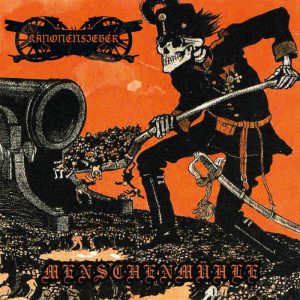 I’m cheating ever so slightly with this one, as Islander already gave it a short but extremely positive write-up as part of one of his Shades of Black columns at the end of last month, but since I’ve become such a big fan of it over the last few weeks (prompted, in part, by the boss’s decision to include a track from it as part of today’s NCS takeover of Gimme Metal Radio, which you should all tune in for) I felt like I wanted to give it some extra coverage.
I’m cheating ever so slightly with this one, as Islander already gave it a short but extremely positive write-up as part of one of his Shades of Black columns at the end of last month, but since I’ve become such a big fan of it over the last few weeks (prompted, in part, by the boss’s decision to include a track from it as part of today’s NCS takeover of Gimme Metal Radio, which you should all tune in for) I felt like I wanted to give it some extra coverage.
With a name that translates to “cannon fever” (essentially the German equivalent of “shell shock”) and an album title which means “human mill”, it’s clear that Kanonenfieber aren’t here to glorify war, and the dedication which accompanies the album makes it clear that that the music “is intended to commemorate the countless victims of World War I”, from the soldiers who were thrown, again and again, into the meatgrinder of trench warfare, to the countless civilians who suffered and starved on the sidelines.
As you can probably guess then, it’s a pretty bleak album, but not one that’s entirely bereft of melody or poetry, whether that’s in the form of the poignant penultimate pause for breath during opener “Die Feuertaufe”, the moody cessation of hostilities part way through “Die schlacht bei Tannenberg”, or the record’s unexpectedly moving folk-ish finale “Verscharrt und Ungerühmt”.
It’s also, of course, an phenomenally furious and punishing piece of work – as befitting its subject matter – which often reminds me a fair bit of Nidingr (which, just to be clear, is a huge compliment) in the way it also incorporates some slight Death Metal leanings, a touch of doomy horror, and a dash of eerie atmosphere, into its blistering blackened assault.
The end result is an album that’s both impressively visceral and unexpectedly varied (not to mention almost indecently catchy), which takes you on a real journey as it moves seamlessly from the chunky, belt-fed riffs of “Dicke Bertha” through the writhing tremolo melodies and punky grooves of “Der letzte Flug” and the ever-changing assault of “Grabenkampf” all the way to the doom-laden peaks of “Unterstandsangst” and the deep, sombre valleys of its solemn epitaph.
War is hell my friends, that much we all know. And this is, fittingly, one hell of a debut, and one which I very much expect to see and hear more from when the final reckoning is made for this year.
PUTRESCINE – THE FADING FLAME
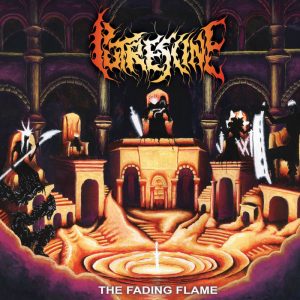 As I commented to a fellow writer recently, some people take it very badly, and very personally, if you write something which goes against the established critical consensus.
As I commented to a fellow writer recently, some people take it very badly, and very personally, if you write something which goes against the established critical consensus.
Case in point, it seems like 90% of the writing/reviewing community implicitly agreed to praise the highly anticipated first album from San Diego death-dealers Putrescine even before they’d heard it, largely (and, to an extent, understandably) due to how good the group’s debut EP was.
The thing is (and I know this will upset some people, but I think it needs saying) that although there’s definitely enough good material on The Fading Flame to construct another pretty kickass EP, as an album it’s much more uneven – its forward-momentum too often hamstrung by a combination of directionless dissonance and generic chuggery – and I’m surprised to see that so many other writers/reviewers have consciously (or possibly unconsciously) elected to overlook this.
It’s an issue which is further exacerbated by the fact that the programmed drums (which aren’t intrinsically a bad thing) sometimes feel like they’re simply following the guitars – keeping the beat and providing ballast – rather than actually driving the songs forward the way they should.
All that aside, however, there’s still a fair bit to love here, and a lot of potential for growth and development of the band’s sound (the recent addition of a real, flesh and blood, drummer to their line-up should hopefully make a huge difference to the percussive side of things, for example).
As I alluded to before, several songs really do show you what the band are capable of – “Devourer of Gods”, for example, is an absolute monster, and the title-track is one seriously twisted piece of tortured technicality, while both “Outside” and “Reek of Putrescine” comes across like a crustier, more emotionally crippling, version of Cannibal Corpse.
It’s also worth pointing out that even some of the tracks which don’t quite hit the bullseye are still worth your time – frantic opener “The Abyss” is (when it’s not simply wallowing in aimless dissonance) the sound of a band willingly throwing themselves and their instruments down a flight of stairs (and I mean that in a good way), while “That Mountain” delivers some undeniably brutal, bone-grinding grooves once you finally get past its interminable intro – and that the dual vocals of Marie McAuliffe and Trevor Van Hook are absolutely gnarly throughout (they’re actually what first attracted me to the project, as it happens) and almost worth the price of admission on their own.
Ultimately, what I’d say is that if you go into this record with the right set of expectations – in this case an album which definitely tries, even if it doesn’t always succeed, to do something different and distinct with a set of well-worn influences – you’ll probably get a lot more out of it, and be able to appreciate it more on its own terms, rather than the terms others have tried to set.
WODE – BURN IN MANY MIRRORS
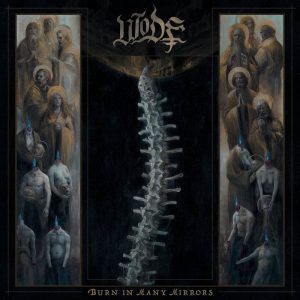 From an album that claims to be a “return to form” to a record that actually is one… the third album from Mancunian Black Metallers Wode is far closer in spirit to the band’s debut (which I thought was so good that I named it one of my Critical Top Ten albums of 2016, a decision which I still stand by) than their slightly less electrifying second album (which, while still good, felt a bit like an overly calculated – and therefore doomed to failure – attempt to recapture the “lightning in a bottle” effect and impact of its predecessor).
From an album that claims to be a “return to form” to a record that actually is one… the third album from Mancunian Black Metallers Wode is far closer in spirit to the band’s debut (which I thought was so good that I named it one of my Critical Top Ten albums of 2016, a decision which I still stand by) than their slightly less electrifying second album (which, while still good, felt a bit like an overly calculated – and therefore doomed to failure – attempt to recapture the “lightning in a bottle” effect and impact of its predecessor).
Granted, the band’s sound has clearly continued to shift away from the more “pure” approach of their self-titled, moving through and beyond the more Dissection/Necrophobic/Sacramentum style of Servants… towards a thrashier, proggier, form of expression that arguably takes just as much (if not more) influence from classic Metallica (some of the guitar work on “Serpent’s Coil”, for example, could almost have come directly from the Ride the Lightning era) as it does Black Metal.
Yes, there’s still the occasional moment where the band’s ambitions lead them so far off the left-hand path that they lose their way a little and end up wandering in the weeds for a while, but for the most part the band’s decision to “go big or go home” (the album’s shortest track – which is arguably its weakest – is still longer, and arguably stronger, than half the songs from its predecessor) has paid off handsomely.
Opener “Lunar Madness”, for example, is just over six minutes of thrashy riffs, galloping rhythms, winding leads and withering blasts that marries the spitfire energy of Exodus to the spiteful melodic edge of the aforementioned Dissection, while the sense of sinister swagger and grim, groovy grandeur underlying “Fire in the Hills” hits the sort of high (voltage) notes that Vreid haven’t managed to reach since the early 2010s (though their new one is, spoiler alert, actually pretty good), and “Vanish Beneath” – once it actually gets into gear – sees the band channelling some significant Goatwhore vibes, all flavoured with an extra dash of Slayer and a touch of unexpectedly gothic glamour.
It’s the tripartite finale of “Streams of Rapture”, however, which proves, emphatically, that (for better or worse) while the band might not be who they once were, they’re finally beginning to grow into who they could be, and this song – an almost ten minute Progressive Black Thrash symphony – is the perfect example of all the still untapped potential (and, to an extent the potential pitfalls) contained within this new phase of their existence.
So while I don’t necessarily think (as I’ve seen some people claiming) that Burn In Many Mirrors is the band’s finest hour (that honour still goes to their debut), nor “the best Black Metal album of the year” (a title which is still very much up for grabs) it’s clear to me that this is the album the band needed to make, the only album they possibly could make, in order to throw off the shackles of their past and find a new direction, a new identity, for themselves. And it definitely does that, while also providing us with a hefty helping of anthemic evil along the way.

That KANONENFIEBER tho’
Is blackened PUNK AF right now!
ist jetzt punkig!
Excited for that Wodeeeeeeeeee
Been listening to Kanonenfieber more than anything (except Empyrium) the last month…fantastic!
I found the new Wode to be as boring as their 2nd release. Their debut is still awesome for me.
I had no idea a female was doing the vocals, although I have to say was not digging the cleans. Solid stuff though in general, reminds me of the days I was listening to Soilwork all the time.